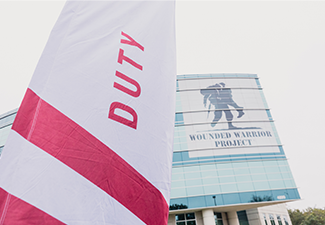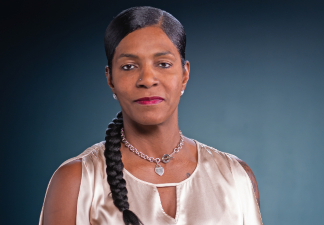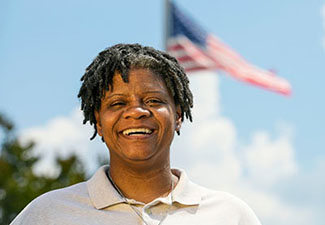Unlocking the Door to Mental Health Well-Being
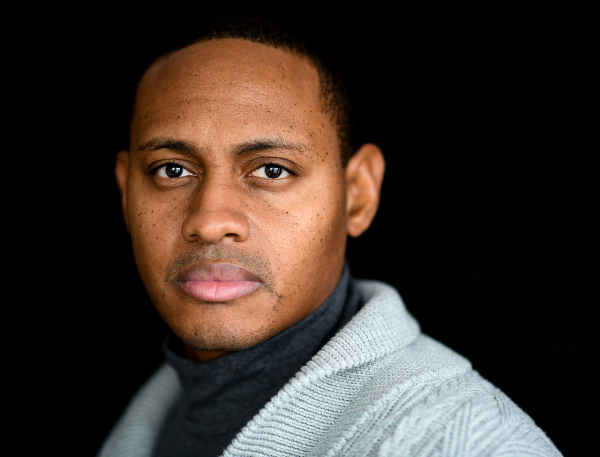
Dr. Tyshawn Jenkins has seen his share of uphill battles, especially while growing up in a tough neighborhood. He joined the Air National Guard with two primary objectives in mind – to give back to this nation and to unlock doors for himself, both personally and professionally.
“I wanted the opportunity to be able to get on a plane, to go overseas, and to be able to see the world as well as to save the country," Tyshawn said.
Like many other service members, coming back from military deployments with invisible wounds was one of the most challenging things he had to face.
Fortunately, he realized he didn’t have to face the challenges alone. A network of fellow veterans buoyed Tyshawn through the last decade and helped him find purpose in sharing his battles, as well as feel confident in his accomplishments.
Accepting Help, and Other Barriers to Veteran Mental Health
Tyshawn started his mental health journey with one small step. Actually, it was a parade of steps.
“My journey started with a friend inviting me to the Veterans Day parade in New York City,” Tyshawn said. He didn’t know about Wounded Warrior Project® (WWP) yet, but while there, Tyshawn met fellow veterans and started hearing similar situations to his own.
Tyshawn had previously thought of himself as less deserving of help than veterans with visible injuries. “I struggled with that a lot. It’s a hard concept.” Despite the barrier in his own mind, he opened up to share his experiences.
Tyshawn was also struggling mentally and knew that he needed more help to manage the challenges he faced.
“When I transitioned out of active duty, I was drinking and not in a good head space. I felt betrayed in relationships, and I felt the military screwed me over.”
Despite having a college degree, it took Tyshawn more than 10 attempts to become a commissioned officer.
"I was the most qualified. I did my best in the interviews. I had the best credentials," said Tyshawn.
Tyshawn’s persistence and a boost from WWP’s Warriors to Work program helped him break through the glass ceiling and advance his career.
On the personal side, it took a while to find healing from PTSD and reach the point where Tyshawn felt he could share the mental health lessons he learned with others.
Wil Williamson, Jr., vice president of connection at WWP and a Marine veteran, and warrior Tonya Oxendine spoke about unique challenges facing Black veterans when seeking mental health services. Watch a video from the recent episode of “Dear Culture,” a podcast hosted by Panama Jackson on The Grio.com.
Similar Problems, Higher Hurdles, and Greater Need for Support
“There are many barriers to mental health care, but culturally, mental health services are not top of mind in many of our communities,” said Wil Williamson, Jr., vice president of connection at WWP, and a Marine veteran.
| HEALING FOR ALL WALKS OF LIFE |
|
According to the most recent Warrior Survey*, WWP serves a diverse group of service members and veterans, including:
*Warrior Survey, Wave 2 |
“Maybe we were told to lean on our community or to lean on ourselves,” Wil observed. “There’s also the barrier of thinking we’re not deserving – somebody else might need those services more than I do.”
WWP emphasizes connection and peer support because it reminds veterans they have people they can count on – and to whom they are accountable – as they were in the military.
Wil has experienced and shared that support personally and professionally. He’s open with his teammates about his healing process, and he shares with family members that help is available.
In fact, that support works across generations of veterans. Wil has an uncle he has admired all his life, who was affected by combat stress and Agent Orange during the Vietnam War.
“He has struggled with PTSD, and he has seen a change in me, so it prompted him to get help for himself,” Wil said. “He said to me, ‘I want to get help just like you did, but I can’t do it by myself.’”
Wil let his uncle know he’s there for him, and there is a community of warriors who will help him through the process. This reverse mentorship shows veterans can help other veterans and build trust, normalizing mental health care.
“My uncle knows that I wore the uniform like he did.”
Not Broken, But Healing
Both Wil and Tyshawn are warriors with different life stories, but similar healing journeys. They have figured out how to empower themselves to heal and how to empower others.
“I’m telling the story, not from a position of being broken, but from a position of resilience – it’s OK to heal,” Wil said. “We can heal together.”
For Tyshawn, WWP became a way to heal with other warriors.
“Wounded Warrior Project saved my life, and I don’t know where I would be without the organization,” Tyshawn said. “WWP provided the resources to help me through Project Odyssey, Warriors to Work, and becoming a peer support group leader – it got me out of the house, and out of a certain mindset.”
Through these interactions, Tyshawn developed a new aspect of his persona. He didn’t have to be a therapist to find ways to open up, share, and help other veterans help themselves.
Tyshawn admits it was daunting at first to speak to veterans who come from different walks of life, and who might have seen “more than I had seen.” But the bond amongst veterans grew naturally.
“When I get around other warriors, I connect with them,” Tyshawn said. “When they thank me for helping them, it’s energizing.
“I’m grateful for those moments when they know that I care. They know that they can count on me.”
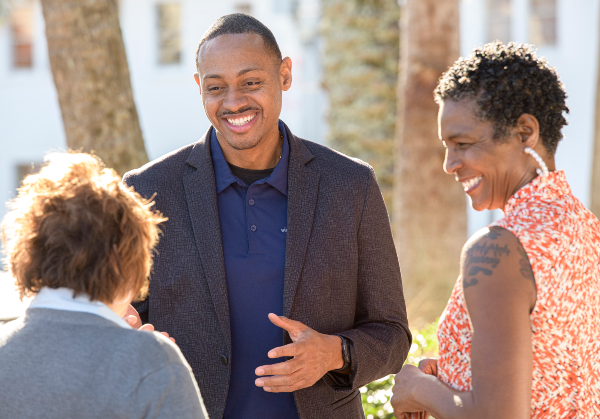
Lean On Me
The peer support group Tyshawn leads meets once per month at a public library in Pennsauken, New Jersey. Between 15 and 20 warriors come together from different backgrounds and different parts of town – some cross the bridge from Philadelphia.
When Tyshawn was promoted to first lieutenant in the Air National Guard, members of the veteran peer support group he leads got him a plaque and came to the promotion ceremony. They plan to be at his grad school graduation as well.
“I love having them there. They have become part of my DNA.”
Group members are there for Tyshawn in times of celebration because he’s been there for them in hard times. Like the time a veteran was on the brink of suicide: “He didn’t want to talk to anyone else, because he didn’t think he could trust anyone,” Tyshawn recalled.
The veteran was saved, and Tyshawn and the group continue to offer support.
When asked about barriers, Tyshawn observed that denial often gets in the way of mental health. “The belief that ‘no, I’m OK, I’m fine.’ I’ve been there. I was in denial, too. Your assumption is that nothing is wrong, when you’re actually crying out for help, and you’re hoping someone will push you a little more toward help.”
Tyshawn would like to reach out to people who are hesitant to seek help with a message of acceptance and support.
“It is tireless work,” Tyshawn said. “If something comes up or when someone is in need, I want to be there for them. We’re here for just a blip. Statistics say that Black men only live to be in their late 60s. I’m 41, so I’ve passed the halfway mark. In the time I’m awake, I want to do as much for other people as I can.”
Tyshawn finished a doctoral program, is volunteering with the Boys and Girls Clubs, and continues to give his time and energy to other veterans through WWP peer support.
He understands the importance of showing up and helping to normalize mental health care in all communities.
He appreciated the words of U.S. Air Force Chief of Staff Gen. Charles “CQ” Brown, Jr., who spoke about the challenges of being a Black man in the military.
“He is someone I found inspiring,” Tyshawn said. “Him speaking out as a four-star general, as a top person in the military, many of us don’t share our experiences out of fear of being kicked out or being ostracized in the military. General Brown gave us the model and opened the door to speak about the things that we went through.”
Wil also understands the importance of showing up.
“Being present helps to tell our stories without having to open our mouths,” he said. “We can show a spirit of resiliency, and you can bring positive change just by being in the room advocating and giving voice.”
Learn more about how veterans are living full lives and helping others combat the stigma associated with veteran mental health.
Contact: Raquel Rivas — Public Relations, rrivas@woundedwarriorproject.org, 904.426.9783
About Wounded Warrior Project
Since 2003, Wounded Warrior Project® (WWP) has been meeting the growing needs of warriors, their families, and caregivers — helping them achieve their highest ambition. Learn more.
